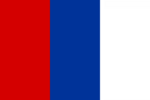Akebarian language
| Akebarian Language | |
|---|---|
 | |
| Regulated by | Akebarian Government |
| Spoken in | |
| Total speakers | Unkonwn |
| Family | Indo-European |
| Writing system(s) | Latin |
| Type | Standard language |
The Akebarian language is a standardised language variety based upon the traditional Northern English dialect spoken in area. It is closely related to the Scots language and other traditional Northern English varieties. Unlike most micronational languages, Akebarian is not a conlang, but rather a standardised register of the traditional vernacular speech of the Yorkshire dales.
Example phrases
- Deeant clow seea fast - do not go on so rapidly
- Ah mun gang heeam - I must go home
- Thae partridges 's squandered ô ower t' tatties - Those partridges have dispersed all over the potatoes
- Ah want tweea yeds o lang lang-loorn ti mak coif-screeds on - I want two yards of long lawn to make cap-borders of
- Ah deeant want ti git mysel intiv a priminary - I don’t want to get into trouble about the matter
- Oor meeat is teugh frae t' audness ont - Our meat is tough from being old
- Ah’d titter gan t’ titherest rooad - I had rather go the nearest way
Linguistic origins
In some respects Akebarian is rather peculiar: there are few or no gutturals; every syllable is distinctly articulated. It is altogether different from the barbarous jargon of the West Riding of Yorkshire, Lancashire, or the colliery districts of Durham and Northumberland.
The dialect spoken in Akebar belongs to a wider linguistic area encompassing Cumberland, Westmorland, South Durham, Northern Lancashire and the North and East Ridings of Yorkshire. The dialect of the region is essentially formed from Danish-influenced Northumbrian speech. It is distinct from, albeit still closely related to, the more purely Anglian Northumbrian dialect of Northumberland and North Durham, which is most typical of rural Northumberland but also forms the basis for the Pitmatic dialect spoken in the Colliery Districts of the two counties and the Geordie dialect spoken on Tyneside. It is also closely related to the Scots language, which is technically also a form of Northumbrian.